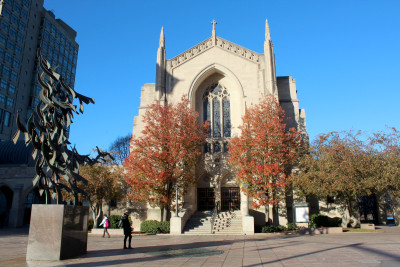
Boston University joined 218 other universities from around the country Nov. 19 to sign the American Campus Act on Climate Pledge to encourage world leaders to act on climate change. The universities, coming from 40 states, all have taken on initiatives to increase sustainability and reduce their carbon footprints.
U.S. President Barack Obama is encouraging the involvement of different sectors of the United States to come together to battle climate change through making commitments to reduce effects on the environment, according to a press release from the White House.
BU has reduced greenhouse gas emissions by 25 percent between 2006 and 2014 by the use of many methods such as upgrading energy facilities and finding cleaner solutions for energy, according to figures from sustainability@BU. The current sustainability goals, according to their website, are to reduce energy consumption by 10 percent between 2012 and 2017 and increase research on climate effects.
BU Student Government President Andrew Cho and Lindsey Chew, an intern at sustainability@BU, visited the White House for the signing of the pledge.
Chew wrote in an email that the initiative started with Twitter dialogue between clean energy leaders and students.
“I got a call from Sue Hall, CEO of Climate Neutral Business Network and driving force of the #CleanEnergyU dialogues, who shared this opportunity with our network of leading campus sustainability directors and students, inviting us to take on the pledge and notifying us also of the potential roundtable opportunity,” she said. “Dennis Carlberg, BU’s sustainability director, swiftly and effectively drafted a pledge which was subsequently approved and signed by [BU] President [Robert] Brown.”
Cho also attended the meeting at the White House with other universities’ leaders. He said it was thrilling to be involved and to visit, but the roundtable was mainly dominated by the university presidents.
“This pledge was significant in that it was spurred on by the White House, and coordinated among over 250 universities,” he said. “It is another way in which President Brown is expressing his commitment to supporting what sustainability@BU is so dedicated to doing. I hope that this will translate into better funding and preference given to their leadership.”
Cho said Obama is prioritizing the reduction of green house gas emissions, which universities, such as BU, should emulate.
“[BU] should offer more education,” he said. “I think there are some new [first year experience] classes, but incorporating it into more majors whether it is international relations or business or health [would further sustainability efforts].”
Julia Winberg, a freshman in the College of Communication, said BU’s involvement with sustainability efforts could just as well come second to other, more pressing issues, but the progress would nonetheless help.
“It is important, it is real, it is happening right now, but I don’t think it is imperative,” she said. “I think there are other issues that need to be focused on first … but I feel like it could only do good for the school, like the school is going to get some great publicity out of it.”
Leila Aframian, a freshman in the College of Arts and Sciences, said the sustainability department is doing all they should to combat climate change, and signing the pledge was important.
“Well I know we have the LEED buildings right so I think that’s a step towards having a sustainable campus and I don’t know what else there really is,” she said. “I feel like it can make a difference on college campuses with their sustainability and resources.”






















































































































